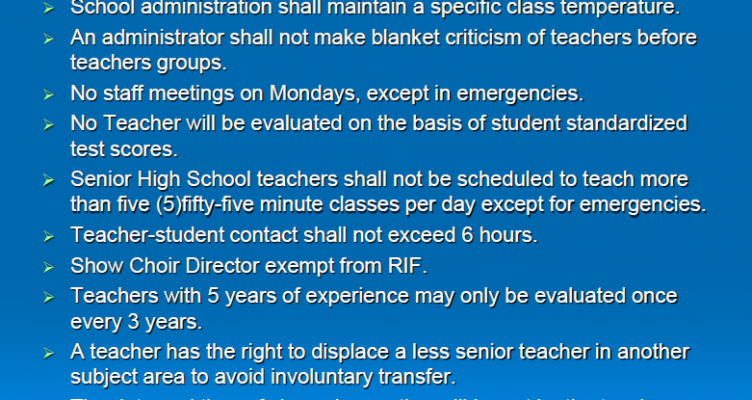Daniels' School Reforms: Too Smart for Tea Party?
Mitch Daniels is regularly held up as one of the best examples of a “serious” and policy-minded conservative. Wednesday in Washington, he gave a speech at AEI laying out his very wonk-heavy plan for education policy in Indiana. What’s surprising was that Daniels made it clear in his speech that his goal wasn’t to destroy public education but to strengthen it.
The education reforms passed by the Indiana legislature are sweeping. The slides from Daniels’ presentation can be viewed here and it’s notable how most of the reforms will improve the quality of Indiana’s regular public schools, not just offer other options such as vouchers or charters. The reforms allow for merit-based assessments of teachers, more ways to hold schools accountable, and eliminate many of the restrictions from union contracts that have hampered how schools are run.
Look at slide 5 titled “Contractual Handcuffs.” In this slide, Daniels lists many of the arbitrary ways in which union contracts had determined how schools are run, with a mind-boggling set of restrictions ranging from what the temperature of a classroom had to be to whether the show choir Director could be fired in an emergency reduction in force to the usual union provisions which prioritize seniority over merit in granting tenure. These are the sorts of restrictions that Daniel's reform efforts sought to remove.
Daniels reforms will make the state more friendly to charters and give more families access to vouchers, but while speaking to AEI, Daniels made clear that while members of the audience were probably most interested in the voucher program (it’s a cause for many conservatives with the D.C. voucher program a special focus for many living in the District) that vouchers are a last resort, not a first option for families:
Public schools will get first shot at every child. ... If the public school delivers and succeeds, no one will seek to exercise this [voucher] choice. But neither will we incarcerate any family’s kid in a school that they don’t believe is working.
Daniels made clear that in addition to helping the small minority of students who will benefit from the expanded choice options, his main goal is to make sure that the public education system used by 90% of the students works better:
You cannot often enough affirm your commitment to the public schools. As I said, 90 percent of Indiana kids are in public schools today. I think even with the new [voucher/charter] option that's available, it'll always be close to that. I really believe that, I would be surprised if it's not. Therefore there's a huge responsibility, and we should all share a commitment, to make the public schools better all the time.
It’s language that would have been described in an earlier era as “compassionate conservatism”. Even his defense of the voucher program invoked language that would have given it the kiss of death on the Glenn Beck show saying that “From a social justice aspect, it [vouchers] is the right thing to do.”
Daniels used his speech to come to the defense of the Obama administration, giving enormous credit to Education Secretary Arne Duncan and the Race to the Top program. While he acknowledged that there has been a significant amount of spending at the Department of Education, he defended Race to the Top, and No Child Left Behind.
Daniels said he “believes in national standards” and joked that this is always hard to implement because “Republicans don’t like ‘national’ and Democrats don’t like ‘standards.’”
Yet this is not just a trivial joke. Other Republicans and conservatives, infused with Tea Party style libertarianism, are turning against many of the reforms and policies that Mitch Daniels endorsed in his speech.
Gov. Rick Perry of Texas declined to have his state participate in Race to the Top, a program designed to reward states which made their teacher evaluations based on merit and which allowed for more charter schools.
Senator Jim DeMint and other Republicans at the end of April introduced legislation to allow states to opt out of the No Child Left Behind act. The reauthorization of this signature piece of legislation is also currently in doubt.
As Kevin Carey wrote in The New Republic these Tea Party efforts to roll back national education reforms play right into the hands of the teachers’ unions who would prefer not to be held accountable to any set of standards. The teachers’ union’s continued dominance in local politics means that they are allies of convenience with the Republicans on education policy federalism.
Daniels’ education reform is a great moment for Republicans to remember why they are conservatives and not libertarians. Remember that the Cato Institute graded Daniels’ tenure as governor as merely a “B” because, among other things: “He wants the government to be efficient but he doesn’t necessarily want it to be smaller.”
If conservatives really do admire Mitch Daniels, they would admire him for making government work efficiently and for all citizens, not dismantling it as many Tea Party activists would advocate.
Follow Noah on Twitter: @noahkgreen
Tweet


